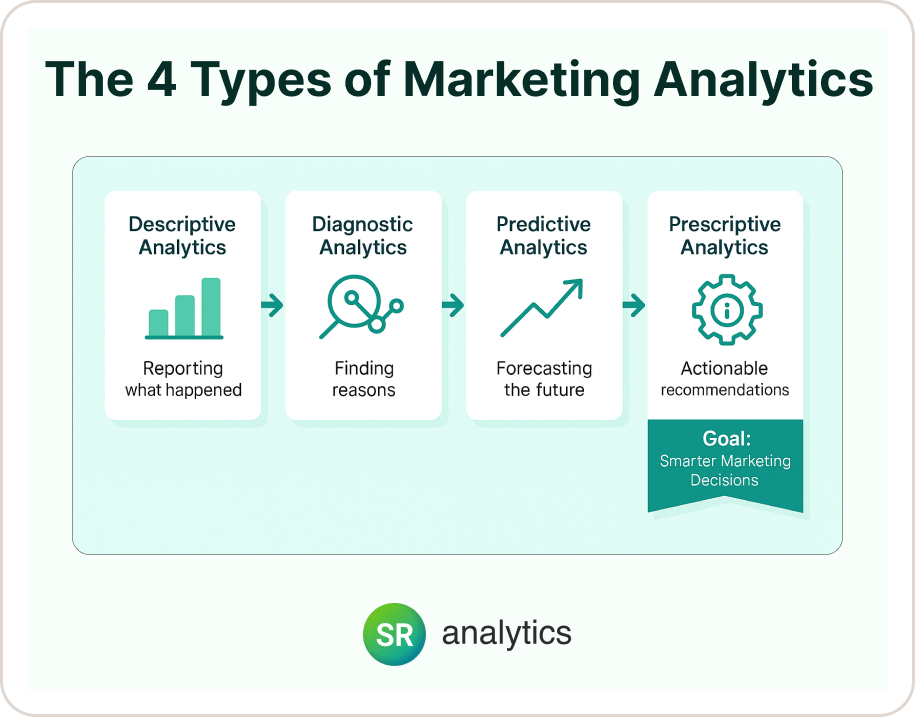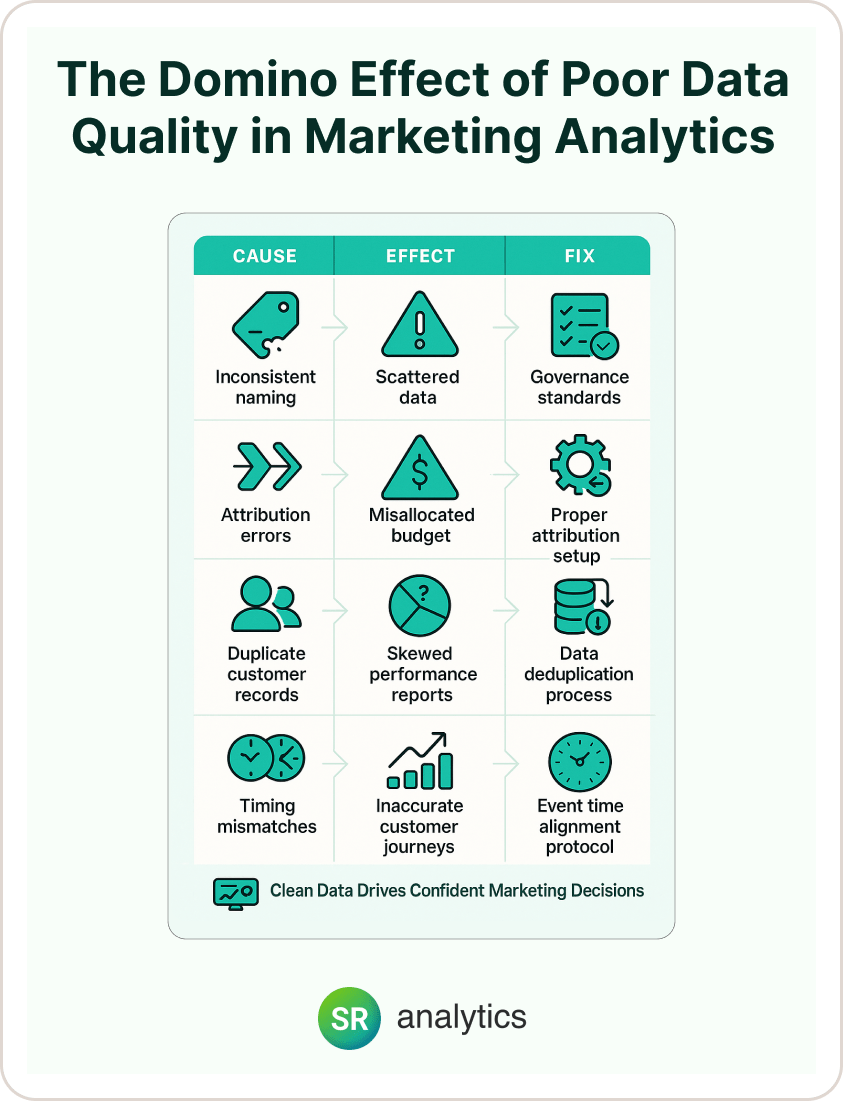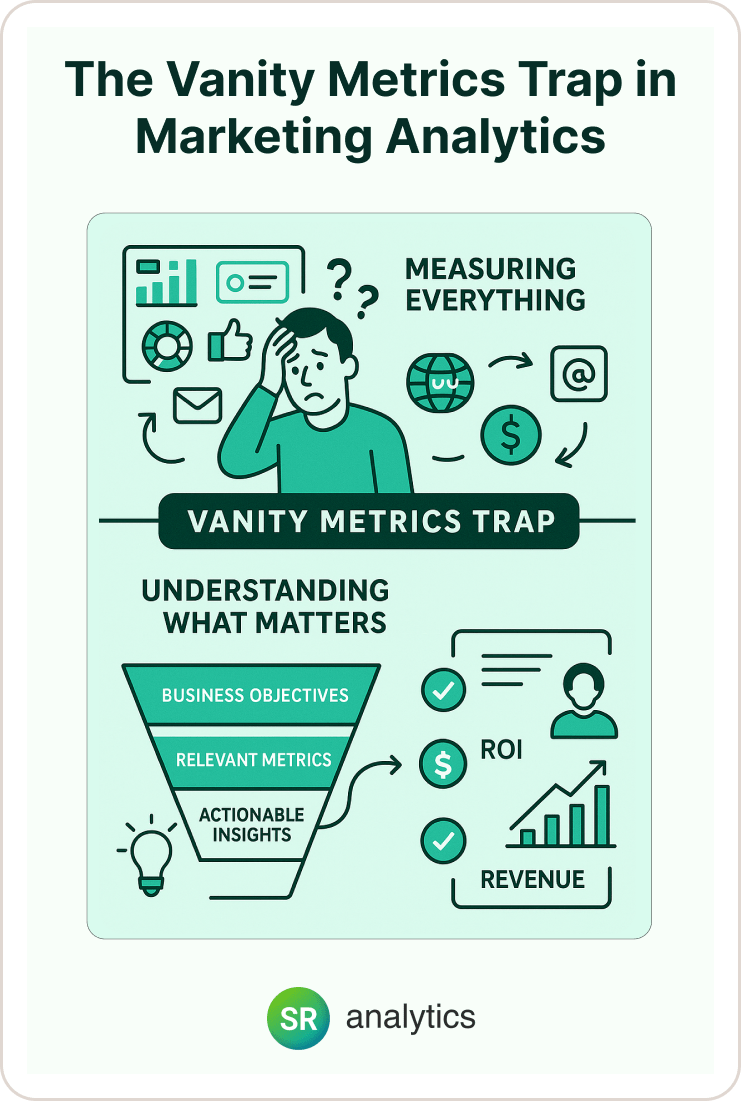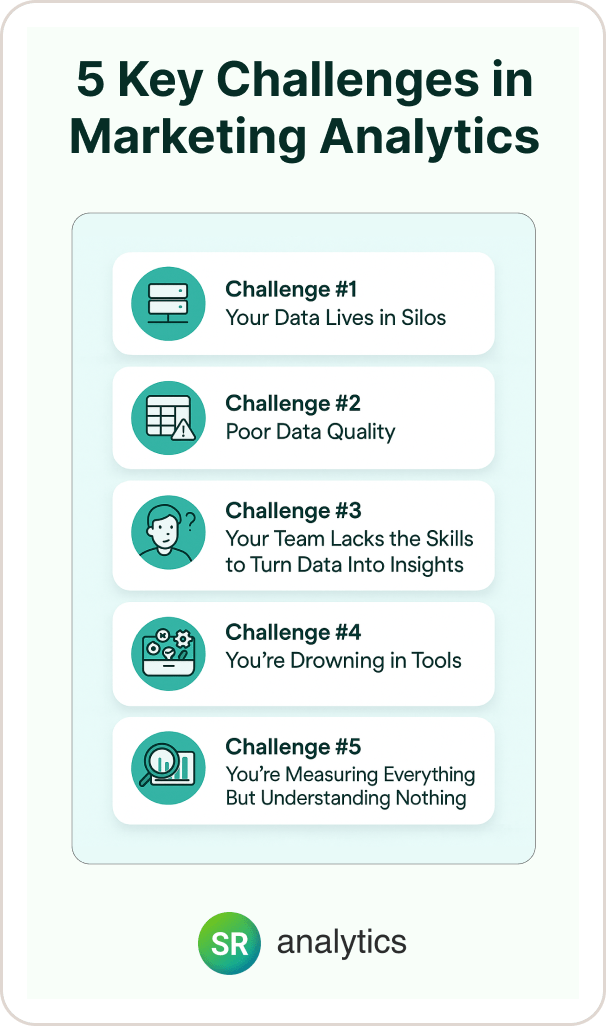Highlights
- 73% of businesses fail at marketing analytics challenges because they focus on vanity metrics instead of revenue-driving insights
- 61% of marketing decision-makers struggle to access integrated data needed for strategic decisions
- Companies implementing proper marketing analytics solutions see 15-20% improvement in ROI within 12 months
- Simple fixes to common marketing analytics challenges can reduce wasted ad spend by 40% immediately
- Strategic marketing analytics best practices turn scattered marketing data solutions into competitive advantages
Introduction
Marketing analytics should be your secret weapon for driving ROI, but for most businesses, it’s become their biggest headache. You have more marketing data solutions than ever before—Google Analytics, social media metrics, email performance reports—yet making sense of it all feels impossible.
Here’s the hard truth: Research shows that 73% of businesses struggle to extract meaningful insights from their marketing data[1], despite having more information available than ever before. Even more concerning? 77% of marketers admit they still lack a unified view of their customer data, making strategic decisions feel like educated guesswork.
But here’s what gets me excited: the gap between companies that struggle with marketing analytics challenges and those that thrive isn’t as wide as you might think. In most cases, it comes down to five common marketing analytics challenges that have surprisingly simple marketing analytics solutions.
In this guide, I’ll walk you through these marketing analytics challenges and show you exactly how to fix them. You’ll discover proven marketing analytics solutions that address each problem systematically. By the end, you’ll have a clear roadmap to transform your scattered marketing data solutions into a strategic advantage that drives real business growth.
What Marketing Analytics Really Means (Beyond the Buzzwords)
Before we dive into the marketing analytics challenges, let’s get clear on what we’re talking about. Too many conversations about marketing analytics challenges get bogged down in technical jargon when the concept is actually pretty straightforward.
Marketing analytics is simply the practice of measuring, analyzing, and optimizing your marketing efforts to drive better business outcomes. The benefits of marketing analytics include answering fundamental questions like: Which channels bring in our most valuable customers? How do different touchpoints work together in the customer journey? Where should we invest our next marketing dollar for maximum impact?
The Four Types of Marketing Analytics (And Why They Matter)

Think of marketing analytics as having four levels, each building on the previous one. Understanding these types of marketing analytics is crucial for developing an effective strategy:
- Descriptive Analytics tells you what happened. This includes your basic reports showing campaign performance, website traffic, and conversion rates. Most companies stop here, but it’s really just the foundation.
- Diagnostic Analytics helps you understand why something happened. This is where you start connecting the dots between different marketing activities and outcomes. Why did conversions spike last month? What caused that drop in email engagement?
- Predictive Analytics forecasts what will happen next. Using historical patterns and statistical models, you can anticipate seasonal trends, predict customer lifetime value, and forecast campaign performance before you spend the budget.
- Prescriptive Analytics recommends what you should do about it. This is the holy grail—automated optimization that adjusts your marketing mix in real-time based on performance data.
Why Most Marketing Analytics Efforts Fall Short
The promise of marketing analytics is compelling: better targeting, higher ROI, and data-driven decision making. So why do so many companies struggle to realize these benefits?
In my experience working with businesses of all sizes, the problem usually isn’t the technology—it’s how the technology is implemented and used. Companies invest in sophisticated analytics platforms but never address the fundamental challenges that prevent those platforms from delivering value.
The five challenges I’m about to share with you represent the most common roadblocks I see. More importantly, they’re all solvable with the right approach.
Challenge #1: Your Data Lives in Silos (And It’s Costing You More Than You Think)
Let me start with a story that perfectly illustrates this challenge. Last year, we worked with an e-commerce company that was convinced their Facebook ads were underperforming. Their Facebook Ads Manager showed decent engagement but poor conversion tracking. Meanwhile, their Google Analytics showed strong organic traffic and email conversions.
The problem? Their data was scattered across different platforms with no way to connect the dots. When we integrated their marketing data solutions into a unified system, we discovered something fascinating: their Facebook ads were actually their highest-performing channel—they just hadn’t been properly attributed.
This is the reality for most businesses today dealing with marketing analytics challenges. Your customer information lives scattered across CRM systems, advertising platforms, email tools, website analytics, and social media dashboards. Each platform tells part of the story, but none give you the complete picture needed to overcome these marketing analytics challenges.
The Real Cost of Data Silos
Data silos don’t just make reporting complicated—they actively sabotage your marketing performance. When you can’t see how different channels work together, you make decisions based on incomplete information.
Consider these common scenarios:
- You cut budget from a “low-performing” channel that’s actually driving assisted conversions
- You double down on channels that look good in isolation but cannibalize other efforts
- You can’t identify which content types drive the highest lifetime value customers
- You miss opportunities to optimize the customer journey across touchpoints
Industry research shows that 46% of businesses cite data silos as their biggest analytical challenge, making comprehensive performance assessment nearly impossible.
The Simple Fix: Unified Marketing Data Solutions
The solution to these marketing analytics challenges isn’t as complicated as it might seem. You need centralized marketing data solutions that aggregate data from all your marketing channels into a single source of truth.
Start with your core integrations:
- Connect your CRM to your website analytics
- Link your advertising platforms to your attribution model
- Integrate email marketing data with customer lifetime value metrics
- Unify social media metrics with conversion tracking
Implement automated data pipelines that eliminate manual reporting. Modern marketing data solutions can automatically sync data between platforms, ensuring you always have real-time insights without the manual work.
Establish consistent metrics across all platforms using marketing analytics best practices. Make sure “conversion” means the same thing in Google Ads, Facebook Ads, and your CRM system. This seems obvious, but it’s one of the most common sources of marketing analytics challenges.
One retail client saw immediate results after implementing unified reporting. They discovered that their highest-engagement social media campaigns were actually their lowest-converting ones—a $50,000 insight that completely changed their content strategy.
Challenge #2: Poor Data Quality Is Undermining Every Decision You Make

Here’s something that might surprise you: in most cases, having no data is actually better than having bad data. Bad data gives you false confidence in poor decisions, while no data at least makes you acknowledge your uncertainty. This represents one of the most critical marketing analytics challenges facing businesses today.
Poor data quality costs U.S. organizations approximately $3 trillion annually, with marketing being particularly vulnerable to quality issues. These marketing analytics challenges compound when teams make strategic decisions based on unreliable information.
The Hidden Data Quality Killers
Poor data quality manifests in ways that are often invisible until they cause serious problems:
- Inconsistent naming conventions: Different team members using varying UTM parameters, campaign tags, and customer identifiers. This scatters performance data across hundreds of poorly labeled sources.
- Attribution errors: Misconfigured conversion tracking that either over-attributes or under-attributes value to specific channels. This leads to budget misallocation and missed opportunities.
- Duplicate customer records: The same customer appearing multiple times across different systems, inflating audience sizes and skewing lifetime value calculations.
- Timing mismatches: Data from different systems capturing events at different times, making it impossible to accurately sequence customer interactions.
Building Marketing Analytics Best Practices for Data Quality
The good news is that most marketing analytics challenges related to data quality are preventable with the right processes and marketing analytics best practices:
Establish clear governance standards. Create documented naming conventions for campaigns, UTM parameters, and customer data fields. Train everyone who handles marketing data on these marketing analytics best practices and make them non-negotiable.
Implement real-time validation. Set up automated checks that flag inconsistencies, duplicates, and missing information before they contaminate your analytics. Many modern platforms can do this automatically.
Schedule regular audits. Monthly data quality reviews help you catch and correct issues while they’re still manageable rather than systemic.
Create feedback loops. When you spot data quality issues, trace them back to their source and fix the process, not just the data.
Companies that implement comprehensive marketing analytics best practices for data quality typically see 25-35% improvements in campaign attribution accuracy and 40% reductions in wasted ad spend from misattributed conversions. These results demonstrate the significant benefits of marketing analytics when implemented correctly.
Challenge #3: Your Team Lacks the Skills to Turn Data Into Insights
I’ll be honest with you: the most sophisticated marketing analytics solutions become worthless if your team doesn’t know how to use them effectively. This skills gap represents one of the most common marketing analytics challenges I see, and it’s not necessarily about technical skills.
Google’s research reveals that 26% of marketers don’t have the right analytics talent, while many existing team members feel intimidated by complex marketing analytics solutions and statistical concepts.
But here’s what I’ve learned: the problem isn’t that marketers can’t handle analytics. It’s that we often try to teach analytics without connecting it to the business outcomes that marketers actually care about. These marketing analytics challenges stem from a fundamental disconnect between technical capabilities and business applications.
The Real Skills Gap
These marketing analytics challenges extend beyond technical abilities. Many marketing professionals excel at creative strategy and customer insight but feel overwhelmed when faced with statistical analysis or data visualization through various types of marketing analytics platforms.
This creates what I call “analytics anxiety”—teams avoid deeper analysis because they don’t trust their ability to interpret sophisticated insights correctly. Meanwhile, business leaders expect immediate insights from expensive analytics investments, creating pressure that further discourages experimentation.
Building Analytics Capability That Sticks
Overcoming these marketing analytics challenges requires a strategic approach to capability building:
Start with business questions, not tools. Instead of teaching people how to use marketing analytics solutions, start by identifying the business questions they need to answer. Then show them how these marketing data solutions help answer those questions.
Create progressive learning paths. Build data literacy incrementally using proven marketing analytics best practices. Start with dashboard interpretation, move to basic analysis, then advance to statistical concepts and predictive modeling.
Pair technical training with strategic context. Help your team understand not just how to pull data, but what the data means for business decisions and how to communicate the benefits of marketing analytics to stakeholders.
Consider expert partnerships. Working with specialized marketing analytics solutions providers can bridge the immediate knowledge gap while building internal capabilities over time. The right marketing analytics consultants understand both the technical implementation and strategic application of these tools.
Organizations that invest systematically in marketing analytics best practices and capability building report 3x higher adoption rates for advanced features and significantly better ROI from their marketing analytics solutions investments.
Challenge #4: You’re Drowning in Tools Instead of Swimming in Insights
The marketing technology landscape has exploded from roughly 150 tools in 2011 to over 9,000 today. While this expansion offers unprecedented capabilities, it also creates marketing analytics challenges I see everywhere: tool overload.
Many organizations suffer from what I call “shiny object syndrome”—constantly adding new marketing analytics solutions without properly integrating existing ones. The result is a fragmented technology stack that creates more marketing analytics challenges than it solves.
Research shows that 58% of marketers plan to unify their marketing data in one place, indicating widespread recognition of this challenge.
The Integration Nightmare
Each new tool requires setup, training, and ongoing maintenance. Data flows become increasingly complex as information moves between systems, creating multiple failure points. Teams end up spending more time managing tools than analyzing insights.
Common symptoms of tool overload:
- Subscription costs that spiral out of control
- Data inconsistencies between different platforms
- Training overhead for multiple interfaces
- Security and compliance complications
- Vendor management complexity
Streamlining Your Marketing Data Solutions
Overcoming this particular set of marketing analytics challenges requires a strategic approach to tool management and implementing effective marketing data solutions:
Conduct a comprehensive tool audit. Document every analytics tool currently in use, including cost, usage frequency, and business value delivered. Most organizations discover significant overlap and underutilization when evaluating their marketing data solutions portfolio.
Prioritize integration capabilities. When evaluating new marketing analytics solutions, focus on those with robust APIs and pre-built integrations with your existing stack. Native integrations reduce complexity and improve data reliability across all types of marketing analytics platforms.
Consolidate where possible. Look for comprehensive marketing data solutions that handle multiple functions rather than point solutions for each specific need. This reduces vendor relationships and simplifies data workflows.
Develop internal expertise. Designate specific team members as specialists for key platforms, making them responsible for training others and optimizing usage according to marketing analytics best practices.
Successful business intelligence implementations typically reduce tool-related costs by 40% while improving team productivity by 50% through streamlined workflows and effective marketing data solutions.
Challenge #5: You’re Measuring Everything But Understanding Nothing

This is perhaps the most insidious of all marketing analytics challenges because it often masquerades as sophisticated analytics. I see companies tracking dozens of metrics across multiple dashboards, creating an illusion of data-driven decision making while actually drowning in meaningless numbers.
The problem isn’t the amount of data—it’s the lack of strategic focus in applying marketing analytics best practices. When everything is a priority, nothing is a priority, and the true benefits of marketing analytics remain unrealized.
The Vanity Metrics Trap
Too many marketing teams get caught up in vanity metrics that feel important but don’t connect to business outcomes. Page views, social media followers, and email open rates might be interesting, but they don’t pay the bills. These marketing analytics challenges prevent teams from focusing on metrics that demonstrate real benefits of marketing analytics.
Companies using strategic analytics frameworks achieve 15-20% improvements in marketing ROI, but only when they focus on metrics that directly influence business objectives through proper marketing analytics solutions.
Building a Strategic Measurement Framework
Addressing these measurement-related marketing analytics challenges requires a systematic approach:
Start with business objectives, not metrics. What does your company actually need to achieve? Revenue growth? Customer acquisition? Market expansion? Work backward from these goals to identify the metrics that truly matter and demonstrate the benefits of marketing analytics.
Implement multi-horizon analysis. Balance short-term performance indicators with long-term brand and customer value metrics. Don’t optimize for this quarter’s conversions at the expense of next year’s customer lifetime value.
Use proper attribution modeling. Modern customer journeys are complex, involving multiple touchpoints across different channels and various types of marketing analytics platforms. Simple last-click attribution often misrepresents the true value of upper-funnel activities.
Focus on statistical significance. Use proper testing methodologies and confidence intervals to ensure your insights are actionable rather than coincidental. This is one of the most important marketing analytics best practices that separates amateur analysis from professional insights that unlock the true benefits of marketing analytics.
Our data analytics consulting approach focuses on connecting measurement frameworks directly to revenue outcomes, ensuring every metric tracked contributes to strategic decision-making.
When to Get Expert Help (And When to DIY)
I’m a big believer in building internal capabilities, but there are definitely times when bringing in outside expertise makes sense. Here’s how to know which approach is right for your situation:
Consider professional help when:
- You’re implementing complex technical solutions like GA4 migrations or multi-platform attribution models
- You need to show results quickly to justify continued investment in analytics
- Your team is overwhelmed and falling behind on other priorities
- You’re dealing with compliance requirements or privacy regulations
Stick with internal development when:
- You have team members who are eager to learn and develop these skills
- Your analytics needs are relatively straightforward
- You have the time to invest in learning and experimentation
- Building internal expertise is a strategic priority for your organization
Consider a hybrid approach when:
- You want to accelerate initial progress while building long-term capabilities
- You need expert guidance on strategy but want to handle day-to-day execution internally
- You’re planning a major analytics transformation that requires both immediate results and sustained improvement
Working with specialized analytics consultants can provide immediate problem-solving while building long-term internal capabilities—a dual benefit that often justifies the investment.
The Bottom Line: Marketing Analytics Is Your Competitive Advantage
Here’s what I want you to remember: marketing analytics isn’t just about tracking performance—it’s about creating sustainable competitive advantages through better decision-making.
McKinsey research demonstrates that companies with comprehensive analytics programs see measurable improvements in customer acquisition, retention, and overall marketing effectiveness. But these benefits only materialize when organizations address the fundamental challenges that prevent analytics from delivering value.
The five challenges we’ve covered—data silos, quality issues, skills gaps, tool complexity, and strategic misalignment—represent significant but entirely surmountable barriers to success.
The companies that thrive aren’t necessarily the ones with the biggest budgets or the most sophisticated tools. They’re the ones that have systematically addressed these challenges and built analytics capabilities that support better decision-making at every level of the organization.
Success requires treating marketing analytics as a core business capability rather than just a collection of tools and reports. Organizations that make this shift don’t just improve their marketing performance—they gain sustainable competitive advantages through superior customer understanding and more effective resource allocation.
Ready to transform your marketing analytics from a necessary evil into your secret weapon? Contact SR Analytics today for a comprehensive assessment of your current analytics setup and a customized roadmap to analytics success. We’ll help you identify the quick wins that can improve your ROI immediately while building the foundation for long-term competitive advantage.






